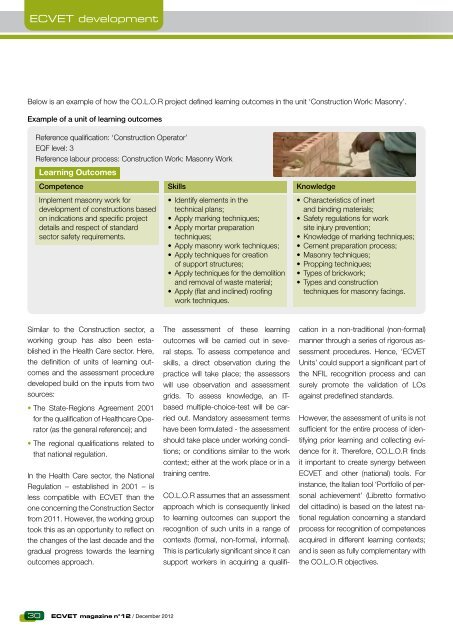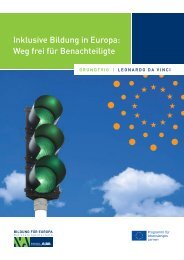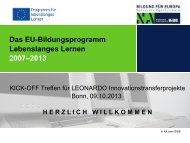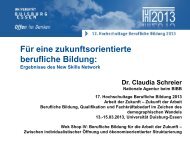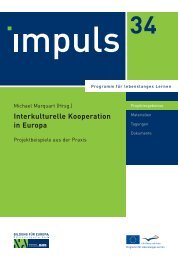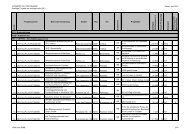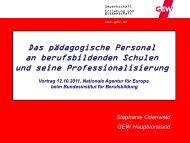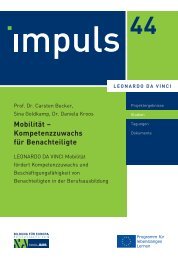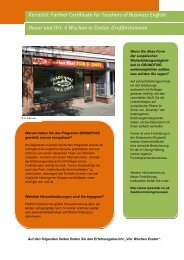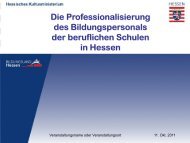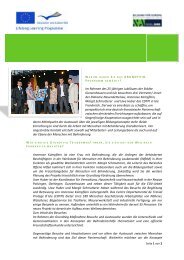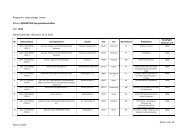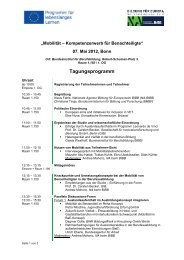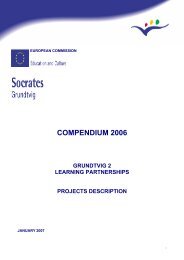You also want an ePaper? Increase the reach of your titles
YUMPU automatically turns print PDFs into web optimized ePapers that Google loves.
ECVET development<br />
Below is an example of how the CO.L.O.R project defined learning outcomes in the unit ‘Construction Work: Masonry’.<br />
Example of a unit of learning outcomes<br />
Reference qualification: ‘Construction Operator’<br />
EQF level: 3<br />
Reference labour process: Construction Work: Masonry Work<br />
Learning Outcomes<br />
Competence<br />
Implement masonry work for<br />
development of constructions based<br />
on indications and specific project<br />
details and respect of standard<br />
sector safety requirements.<br />
Similar to the Construction sector, a<br />
working group has also been established<br />
in the Health Care sector. Here,<br />
the definition of units of learning outcomes<br />
and the assessment procedure<br />
developed build on the inputs from two<br />
sources:<br />
• The State-Regions Agreement 2001<br />
for the qualification of Healthcare Operator<br />
(as the general reference); and<br />
• The regional qualifications related to<br />
that national regulation.<br />
In the Health Care sector, the National<br />
Regulation – established in 2001 – is<br />
less compatible with ECVET than the<br />
one concerning the Construction Sector<br />
from 2011. However, the working group<br />
took this as an opportunity to reflect on<br />
the changes of the last decade and the<br />
gradual progress towards the learning<br />
outcomes approach.<br />
30 ECVET magazine n°12 / December 2012<br />
Skills<br />
• Identify elements in the<br />
technical plans;<br />
• Apply marking techniques;<br />
• Apply mortar preparation<br />
techniques;<br />
• Apply masonry work techniques;<br />
• Apply techniques for creation<br />
of support structures;<br />
• Apply techniques for the demolition<br />
and removal of waste material;<br />
• Apply (flat and inclined) roofing<br />
work techniques.<br />
The assessment of these learning<br />
outcomes will be carried out in several<br />
steps. To assess competence and<br />
skills, a direct observation during the<br />
practice will take place; the assessors<br />
will use observation and assessment<br />
grids. To assess knowledge, an ITbased<br />
multiple-choice-test will be carried<br />
out. Mandatory assessment terms<br />
have been formulated - the assessment<br />
should take place under working conditions;<br />
or conditions similar to the work<br />
context; either at the work place or in a<br />
training centre.<br />
CO.L.O.R assumes that an assessment<br />
approach which is consequently linked<br />
to learning outcomes can support the<br />
recognition of such units in a range of<br />
contexts (formal, non-formal, informal).<br />
This is particularly significant since it can<br />
support workers in acquiring a qualifi-<br />
Knowledge<br />
• Characteristics of inert<br />
and binding materials;<br />
• Safety regulations for work<br />
site injury prevention;<br />
• Knowledge of marking techniques;<br />
• Cement preparation process;<br />
• Masonry techniques;<br />
• Propping techniques;<br />
• Types of brickwork;<br />
• Types and construction<br />
techniques for masonry facings.<br />
cation in a non-traditional (non-formal)<br />
manner through a series of rigorous assessment<br />
procedures. Hence, ‘ECVET<br />
Units’ could support a significant part of<br />
the NFIL recognition process and can<br />
surely promote the validation of LOs<br />
against predefined standards.<br />
However, the assessment of units is not<br />
sufficient for the entire process of identifying<br />
prior learning and collecting evidence<br />
for it. Therefore, CO.L.O.R finds<br />
it important to create synergy between<br />
ECVET and other (national) tools. For<br />
instance, the Italian tool ‘Portfolio of personal<br />
achievement’ (Libretto formativo<br />
del cittadino) is based on the latest national<br />
regulation concerning a standard<br />
process for recognition of competences<br />
acquired in different learning contexts;<br />
and is seen as fully complementary with<br />
the CO.L.O.R objectives.


